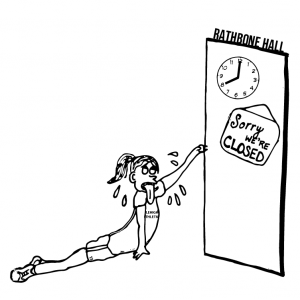The clock strikes 7:30 p.m. Crowds of sweaty, tired and hungry Lehigh athletes make their way through the doors of Rathbone, one of the four dining halls on campus.
Athletes from various sports teams cut in front of one another, their Lehigh ID cards already in hand so they can quickly swipe in, head directly to their food station of choice and grab what’s left, or as much as they can before closing time.
This dining hall routine occurs not just once, but each day for student athletes.
According to football senior tight end Chris Ruhl, student athletes make up a majority of Rathbone patrons from 7:15 p.m. — when most athletes get out of practice — to 8 p.m., which is closing time.
However, athletes often miss out on this period of time when practices run late, resulting in athlete’s needing to find dinner alternatives after missing dining hall hours. This happens often, and finding alternatives can include athletes resorting to unhealthy meal options and spending extra money on food.
“For field hockey, we usually get out of practice during the week around 7:30 to 8 p.m. at the earliest,” sophomore midfielder/defender Laura Yuh said. “By the time we get to the dining halls, usually Rathbone or Upper Court, our only options are whatever is left over from the dinner rush, or we have to go out to eat.”
Yuh’s teammate, sophomore defender Julia Washburn, also mentioned how showering and changing takes extra time. By the time she and her teammates head back over the mountain to Asa Packer campus, the dining halls are usually putting away food or are closed. She also said it is especially difficult for freshmen because they do not have cars on campus, so they often do not have the chance to travel and get food off campus like the upperclassmen do.
While Rathbone stays open the latest out of the four main dining halls — the other three being lower court, the Brodhead student restaurant and the Asa Packer dining room — 8 p.m. just doesn’t work for many athletes, and many wish the dining halls would stay open just a little later.
“We have practice at 10 a.m. on the weekends that we don’t have games,” said women’s soccer freshman midfielder/defender Clare Severe. “So, on Sunday’s that can be tough when the dining hall isn’t open.”

Illustrated by Liz Cornell
Ava Roth, a freshman forward/midfielder on the women’s soccer team, also said because Rathbone isn’t open until 10:25 a.m. on Sundays, players on her team must resort to places like Johnny’s Bagels & Deli by Farrington Square for breakfast before their 10 a.m. practice. Not only does this limit location options, but Johnny’s does not accept meal swipes, meaning athletes would have to use GoldPlus or their own money.
For some teams like football, its schedule varies throughout the week, allowing those who eat at the dining halls to, on some days, actually sit down and eat their meal without worrying about closing. On other days, however, such as Wednesdays, Ruhl said that the football team has night practice which runs after 9 p.m.
The team eats dinner before their night practice from 4:30 to 5:30 p.m. By the time football is done with practice, many of the players are hungry again. Since the dining halls are closed at this time, Ruhl said freshmen often grab something to eat at Hawk’s Nest or Domino’s Pizza after practice, which is a choice based more on convenience than health benefits. The upperclassmen drive to Wawa or cook in their off campus or fraternity houses.
Student athletes are not the only ones to realize this problem.
“I am aware that our athletic teams have conflicts with the timing of training sessions and the hours at Rathbone and other dining halls,” women’s soccer coach Eric Lambinus said. “Our priority is to schedule our practices when none of our student athletes have class conflicts, and unfortunately, that often overlaps with the times available to eat at the dining halls.”
Lambinus also said how coaches and athletic administrators have met with Lehigh Dining Services over the summer and are currently working on a plan to address these issues.
Furthermore, coaches such as track and field assistant coach Jeff Pflaumbaum, must work in the “existing paradigm of compromised training.”
“I have to dismiss my athletes by 7:45 p.m. so they can make it to the dining hall,” he said. “If they make it on time, they are usually left with limited options, not ones that would be recommended for athletes in training.”
One of the main concerns that correlates with athletes entering the dining areas right before closing time is the meal choices with which they are left.
“When we go to the dining halls, they often stop serving hot food at 7:30 p.m. or they run out of certain items like fresh fruit,” Roth said. “We always find that we are in a rush after practice so that we can make it for the hot food.”
Dining Services, however, recognizes the problems and conflicts with dining hours and student athlete schedules. David Joseph, the executive director of student auxiliary services, said he and other individuals from dining services hold focus group meetings with the Student Athlete Council. The most recent meeting was Sept. 17.
“Our goal is to hear the council’s views on dining services and how we can better meet their needs and what we can do to improve,” Joseph said.
Joseph said he and Dining Services have looked to extend hours at Rathbone, but it has been cost prohibitive in the past. He said his team believes they have a good solution to the situation, but won’t be able to implement it until next year, after they review costs and impacts on meal plan rates for the 2016-17 year.
“We have reminded the dining staff at Rathbone that food should be left out until the 8 p.m. closing time, and I think they are adhering to this,” he said.
Along with this, Joseph and those who attended the most recent student athletes’ focus group meeting proposed a number of ideas such as promoting to-go containers to student athletes as a way to get food prior to practice when they have a late practice; the possibility of swiping for dinner at lunch, so an athlete can eat lunch but also get food to go for dinner; the possibility of Hawk’s Nest and Common Grounds to take meal swipes; a fourth meal period which would keep certain dining areas open later; and switching menu arrangements at Hawk’s Nest so healthier options like wraps are displayed rather than the unhealthy options students believe only exist.
Although, for now, student athletes will continue rushing to dining halls before closing time to get the last helping of whole grain pasta or piece of fresh fruit. But athletes, coaches and Dining Services will continue these focus group meetings to work together and find a potential solution to better athletes’ dining hall experiences.





Comment policy
Comments posted to The Brown and White website are reviewed by a moderator before being approved. Incendiary speech or harassing language, including comments targeted at individuals, may be deemed unacceptable and not published. Spam and other soliciting will also be declined.
The Brown and White also reserves the right to not publish entirely anonymous comments.